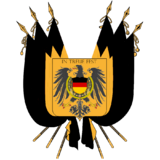Chancellor of Acrea: Difference between revisions
No edit summary |
No edit summary |
||
| Line 42: | Line 42: | ||
}} | }} | ||
The '''Chancellor of Acrea''' ([[wikipedia:German Language|German]]: '' | The '''Chancellor of Acrea''' ([[wikipedia:German Language|German]]: ''Kanzlerin des Königreich Nordreichs'') is the {{wp|head of government}} of the [[Acrea|Kingdom of Acrea]]. | ||
The position originates from the late middle ages, when the office of ''Kanzler'' was created in the newly re-unified Acrean state as the chief minister overseeing both the noble legislature and the citizen's legislature- the early predecessors of the modern ''Reichshof'' and '' | The position originates from the late middle ages, when the office of ''Kanzler'' was created in the newly re-unified Acrean state as the chief minister overseeing both the noble legislature and the citizen's legislature- the early predecessors of the modern ''Reichshof'' and ''Landtag''. As the role of the monarchy in the government evolved, the office of Chancellor gradually became the effective leader of the Acrean state with only the Crown ranking higher. The Monarch has the ability to dismiss the whole or part of parliament, and the ability to dismiss the Chancellor. | ||
The Chancellor and the government are, in practice, appointed by the Monarch, although today the appointment of the government is deferred to an election in which constituents elect their representatives to the Reichstag. The majority party then selects nominations for the position of Chancellor, who is typically but not always the leader of the party. There is no law restricting the social status of the Chancellor; although the majority of Chancellors since the creation of the position have come from the Reichstag. | The Chancellor and the government are, in practice, appointed by the Monarch, although today the appointment of the government is deferred to an election in which constituents elect their representatives to the Reichstag. The majority party then selects nominations for the position of Chancellor, who is typically but not always the leader of the party. There is no law restricting the social status of the Chancellor; although the majority of Chancellors since the creation of the position have come from the Reichstag. | ||
Revision as of 12:49, 30 May 2019
| Chancellor of the Kingdom of Acrea | |
|---|---|
 Coat of Arms of His Majesty's Government | |
| Style | Kanzlerin (informal) Her Excellency (diplomatic) |
| Status | Head of Government |
| Reports to | Parliament |
| Residence | Kanzleramt (official residence and office) Thalerhof (country residence) |
| Appointer | Friedrich Leopold III |
| Term length | At His Majesty's pleasure |
| Constituting instrument | Reichsverfassungsurkunde |
The Chancellor of Acrea (German: Kanzlerin des Königreich Nordreichs) is the head of government of the Kingdom of Acrea.
The position originates from the late middle ages, when the office of Kanzler was created in the newly re-unified Acrean state as the chief minister overseeing both the noble legislature and the citizen's legislature- the early predecessors of the modern Reichshof and Landtag. As the role of the monarchy in the government evolved, the office of Chancellor gradually became the effective leader of the Acrean state with only the Crown ranking higher. The Monarch has the ability to dismiss the whole or part of parliament, and the ability to dismiss the Chancellor.
The Chancellor and the government are, in practice, appointed by the Monarch, although today the appointment of the government is deferred to an election in which constituents elect their representatives to the Reichstag. The majority party then selects nominations for the position of Chancellor, who is typically but not always the leader of the party. There is no law restricting the social status of the Chancellor; although the majority of Chancellors since the creation of the position have come from the Reichstag.
